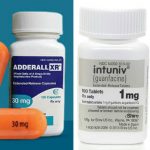Can You Take Adderall While Pregnant or Trying To Get Pregnant?

Reasearch has shown that maternal stress during pregnancy increases the risk of Attention deficit hyperactivity disorder (ADHD) diagnosis later in life, independently of other factors that have been previously reported. If you have ADHD, you are more likely sensitive to hormone shifts. Dramatic drops in estrogen increase ADHD symptoms. However, in the first trimester, there is a dramatic increase in estrogen and then levels out to a steady increase in the second and third trimester, which can lessen your ADHD symptoms.
Although some medicines are considered safe during pregnancy, the effects of other medicines on your unborn baby are unknown. Certain medicines can be most harmful to a developing baby when taken during the first three months of pregnancy, often before a woman even knows she is pregnant.
It can be hard to know if a medicine is safe for your baby. Most medicines are not studied in pregnant women. That’s because researchers worry about how the medicines might affect the baby. But some medicines have been taken for so long by so many women that doctors have a good idea of how safe they are.
What is Adderall?
Adderall is the brand name for the combination of dextroamphetamine and amphetamine. It’s a prescription stimulant used primarily to treat ADHD or narcolepsy (daytime sleepiness).
The medication alters certain naturally-occurring chemicals in your brain by enhancing the effects of neurotransmitters like dopamine, norepinephrine, and, to a lesser degree, serotonin.
Adderall comes in either an immediate-release tablet or a time-release capsule (Adderall XR). It can interfere with sleep, so it should be taken in the morning. If you’re prescribed Adderall, a doctor will most likely start you off with a low dose to make sure you can tolerate it. Then, the dose can be slowly increased.
Adderall is a federally controlled substance and should not be taken without medical supervision. Using Adderall without a prescription can lead to misuse or dependence, according to the National Institutes of Health (NIH) database for prescription and nonprescription drugs.
How does Adderall work?
For people with ADHD, Adderall may improve focus and attention while reducing hyperactivity and impulsive behavior. It works by increasing the amount of dopamine and norepinephrine in the brain.
Dopamine helps the brain reinforce rewarding behaviors. Norepinephrine affects your heart rate, blood vessels, blood pressure, and breathing. It can also affect your blood sugar.
It may have similar effects on people who do not have ADHD. Medications for ADHD like Adderall may be more effective when used along with behavioral therapy or a comprehensive treatment plan that may include psychological, educational, or social therapies.
For this reason, most medications used to treat ADHD, including Adderall, are considered controlled substances. This is why most prescriptions for ADHD medications are typically not for more than 30 days.
Can You Take Adderall While Pregnant or Trying To Get Pregnant?
No, taking Adderall while pregnant or trying to get pregnant is not safe because a study from the Centers for Disease Control and Prevention (CDC) found that taking attention-deficit/hyperactivity disorder (ADHD) medications like Adderall increases the risk of some types of birth defects, especially during early pregnancy.
The study which is among the first few studies to look at ADHD medicine use among pregnant women and risk for individual birth defects also reported an increase in the number of women using (ADHD) medications.
Previously, Adderall was considered a Class C, meaning it is potentially harmful, based on animal studies, but there are no available human studies from which to make a determination of safety for human babies. The few human studies that do exist mainly focus on drug abuse and may not be applicable to the prescribed use of Adderall and other stimulants during pregnancy.
Adderall can also complicate your menstrual cycle if you are trying to get pregnant. Some medical studies have shown that a woman’s menstrual cycle, primarily influenced by estrogen, can affect how bioavailable Adderall is to her body. During the follicular phase, which is the first 14 days of the menstrual cycle, Adderall has a greater impact on the body, including negative side effects. Women reported feeling high and also experiencing stronger cravings for, and physical dependency on, Adderall. The greater presence of estrogen during this time may enhance the effects of amphetamines because estrogen can also trigger the release of dopamine in the brain.
So if you are pregnant, or trying to get pregnant avoid Adderall and discuss with your doctor about safer alternatives you can use instead of Adderall.
Adderall side effects
Get emergency medical help if you have signs of an allergic reaction to Adderall: hives; difficult breathing; swelling of your face, lips, tongue, or throat.
Adderall may cause serious side effects. Call your doctor at once if you have:
• signs of heart problems – chest pain, trouble breathing, feeling like you might pass out;
• signs of psychosis – hallucinations (seeing or hearing things that are not real), new behavior problems, aggression, hostility, paranoia;
• signs of circulation problems – numbness, pain, cold feeling, unexplained wounds, or skin color changes (pale, red, or blue appearance) in your fingers or toes;
• a seizure (convulsions);
• muscle twitches (tics); or
• changes in your vision.
Seek medical attention right away if you have symptoms of serotonin syndrome, such as agitation, hallucinations, fever, sweating, shivering, fast heart rate, muscle stiffness, twitching, loss of coordination, nausea, vomiting, or diarrhea.
Adderall can affect growth in children. Tell your doctor if your child is not growing at a normal rate while using this medicine.
Common side effects of Adderall may include:
• stomach pain;
• loss of appetite;
• weight loss;
• mood changes;
• feeling nervous;
• fast heart rate;
• headache;
• dizziness;
• sleep problems (insomnia); or
• dry mouth.
This is not a complete list of side effects and others may occur. Call your doctor for medical advice about side effects. You may report side effects to FDA at 1-800-FDA-1088.





